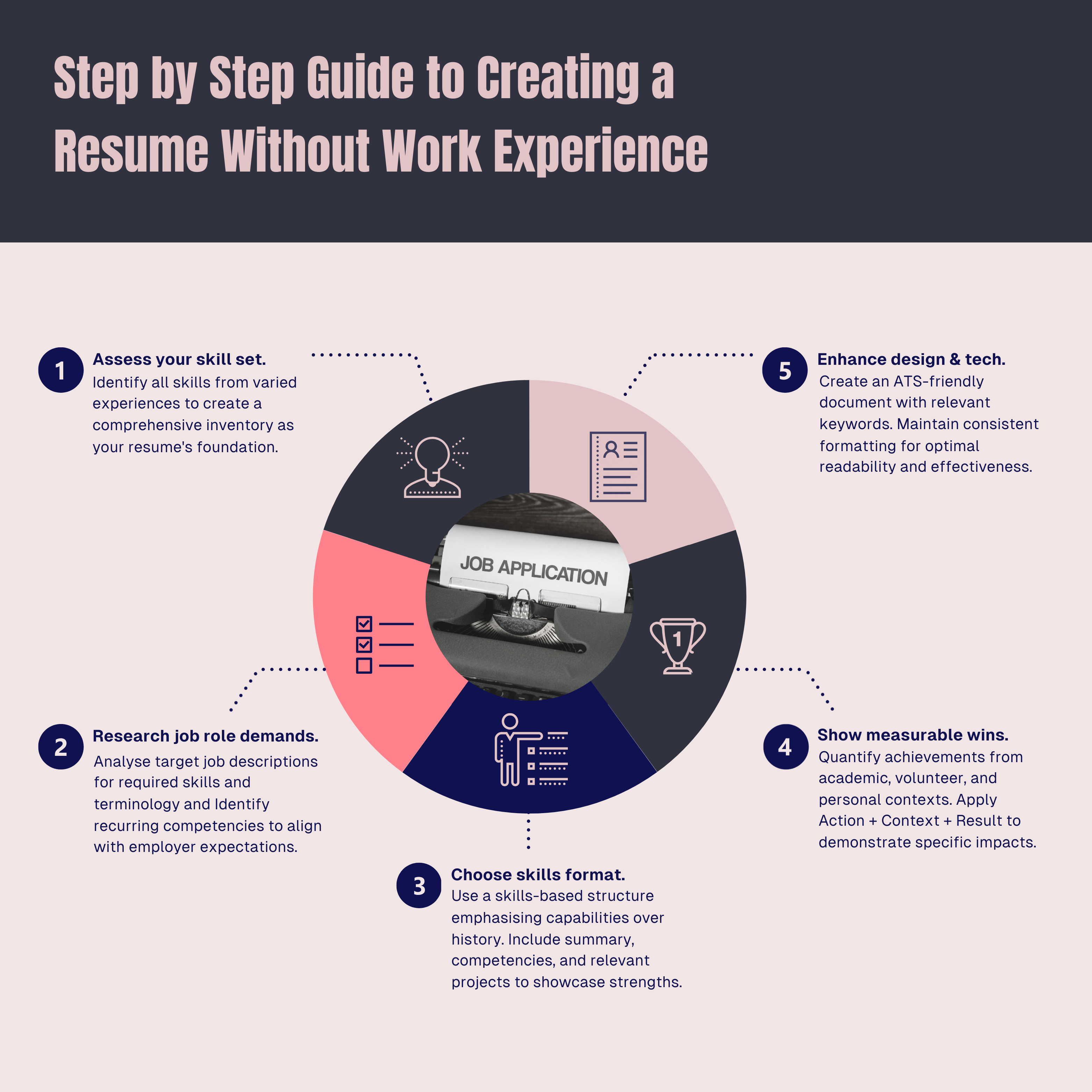ALorem ipsum dolor sit amet, consectetur adipiscing elit. Maecenas eu porta tellus. Mauris sit amet efficitur velit, vitae mollis ipsum. Cras a facilisis sem, vulputate accumsan diam. Praesent molestie, mauris nec dictum condimentum, sem metus lobortis orci, vitae auctor nunc ante et nunc. Phasellus dui ligula, hendrerit eget urna sed, porttitor sagittis libero. Nam tempor felis quis erat imperdiet pulvinar. Aenean euismod vitae nibh eu pretium. Cras quis elementum risus, nec ultrices felis. Nulla aliquet elementum erat et finibus. Quisque aliquam quam ultrices nibh congue sollicitudin
You stare at the blank document, cursor blinking expectantly. The job description clearly asks for a resume, but your work history section looks sparse at best. Whether you're a recent graduate, changing careers, or entering the workforce after a long gap, the challenge feels the same: how do you create a compelling resume when your professional experience doesn't match your ambitions?
This common dilemma stops many talented individuals from applying to roles they could excel in. The truth is, experience comes in many forms beyond traditional employment. Your value isn't determined solely by previous job titles.
The most damaging form of self-limitation isn't lack of experience. It's the inability to recognise and articulate the valuable skills you've already developed through other aspects of your life.
Before diving into specific tactics, it's important to understand how employers actually evaluate resumes today. The traditional chronological work history is becoming less relevant as companies increasingly prioritise capabilities over credentials.
What employers actually look for:
Modern resume screening often involves Applicant Tracking Systems (ATS) that scan for keywords related to skills and competencies, not just job titles. This creates a significant opportunity for those without traditional work experience to stand out through strategic presentation of their capabilities.

Your first task is to identify the full spectrum of skills you possess, regardless of where you acquired them. Be mindful of burnout during this process - pushing yourself too hard to 'prove' your worth can be counterproductive. The goal is thoughtful self-assessment, not exhaustive self-criticism. See our guide on Recognising and Addressing Burnout for strategies to maintain healthy perspective during your job search.
Action items:
For each item, identify both technical skills (specific tools, methodologies, or knowledge areas) and transferable skills (communication, problem-solving, organization, etc.).
This inventory becomes your resource pool for constructing various sections of your resume. Remember, it's not about where you learned something, but what you can do and how it creates value.
Before writing a single word on your resume, you need to understand exactly what your target roles require.
Action items:
This research serves two critical purposes. It helps you align your resume with employer expectations, and it enables you to speak the language of your desired industry, even without direct experience in it.
Unlike chronological resumes that emphasise work history, a skills-based (or functional) resume highlights your capabilities first. This format is ideal for those with limited work experience.
Key sections to include:
This structure places your skills front and center while contextualising them through specific projects and achievements rather than job titles.
The most compelling resumes don't just list skills. They demonstrate impact through specific, measurable achievements. Without traditional work experience, you'll need to find these examples in other contexts. Many professionals without traditional experience struggle with imposter syndrome when describing their accomplishments. Remember that overcoming imposter syndrome starts with acknowledging your legitimate skills, regardless of where you developed them.
Sources of quantifiable achievements:
The formula is simple: Action + Context + Result. What did you do, in what setting, and what measurable outcome did it produce?
In a competitive job market, how your resume looks and functions matters almost as much as its content. This is especially true when you need to compensate for limited work experience.
Technical considerations:
Remember, your resume is both a marketing document and a technical tool that needs to work within employer systems. Balance creativity with functionality.
Crafting a resume without traditional work experience isn't about hiding your limitations. It's about reframing your narrative to highlight the value you genuinely offer. The most successful professionals recognise that experience is merely a proxy for capabilities. By directly showcasing those capabilities through a skills-based approach, you can bypass the experience paradox entirely.
The most important element of this process is authenticity. Don't claim skills you don't possess or exaggerate achievements. Instead, focus on thoughtfully connecting your actual capabilities to employer needs, regardless of how you developed those capabilities.
At WCFC Academy, we've helped professionals at all career stages craft resumes that get results, even without traditional experience. Through our frameworks and personalised guidance, we transform the job search from a source of anxiety into an opportunity for authentic self-presentation.
Ready to break free from the constraints of the "experience required" cycle? Take the first step today with our free Gallup StrengthsFinder Assessment. Understanding your innate strengths provides the foundation for a compelling resume that showcases who you really are, not just where you've worked. Let's get to building unshakable professional confidence now.
“Raesent molestie, mauris nec dictum condimentum, sem metus lobortis orci, vitae auctor nunc ante et nunc ligula”



Your potential is infinite. Our mission is to activate and unleash it in the right environment.